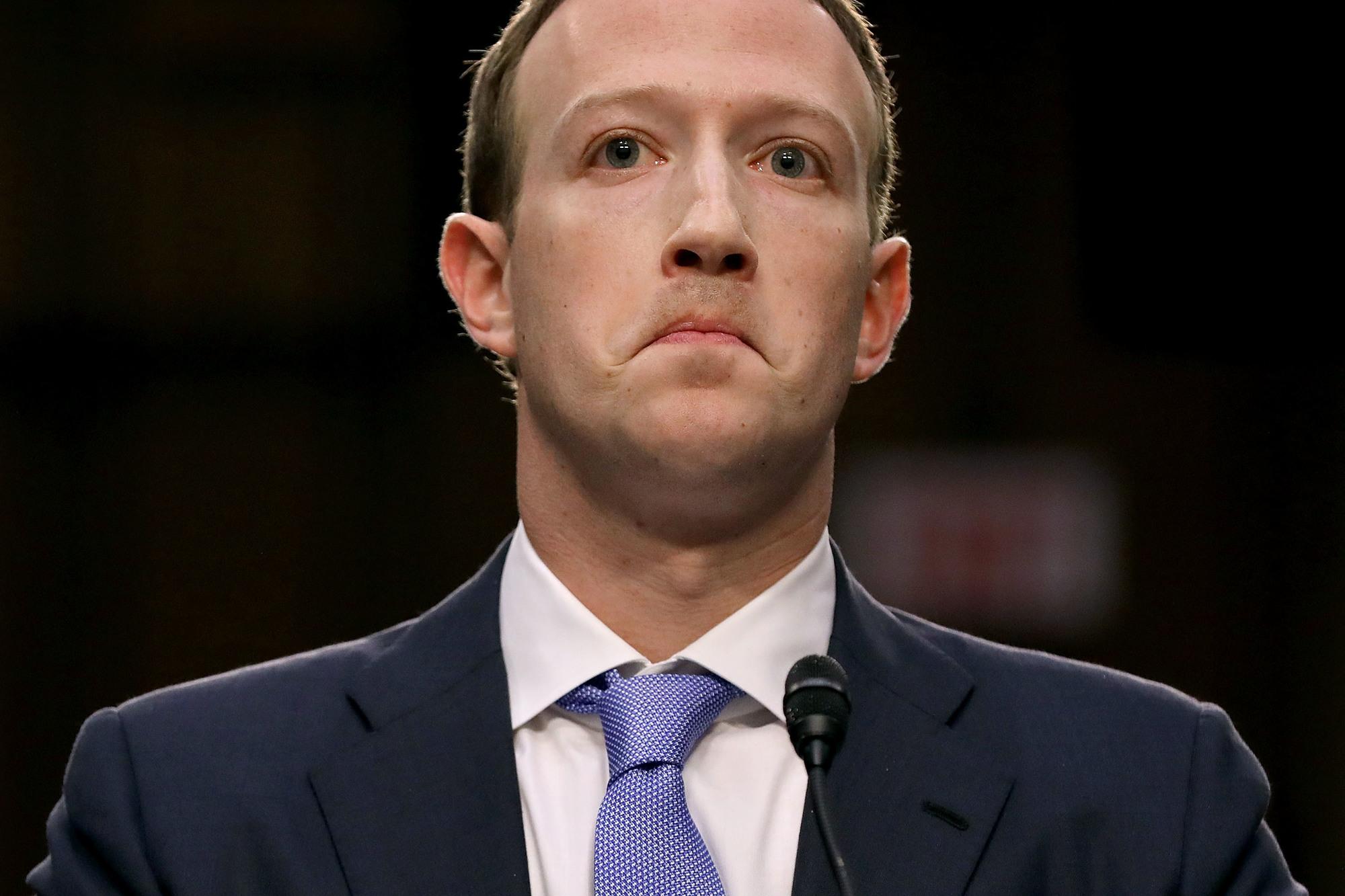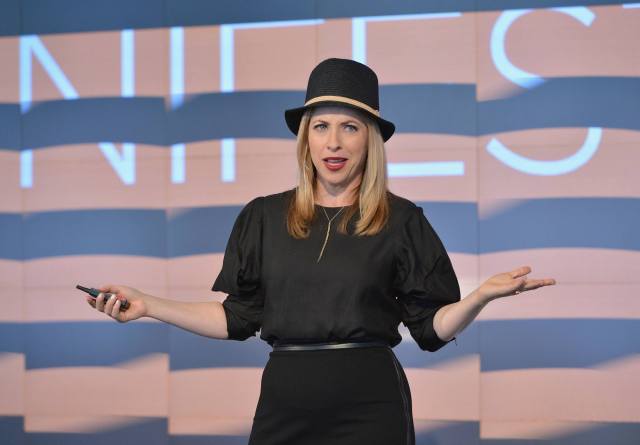Tiffany Shlain, filmaker and founder of the Webby Awards. (Credit: Slaven Vlasic / Getty Images)

Searching for guides in the perplexing world of 21st century technology? Join the club.
Some have pretty much given up on trying to find a way through. Their commitment to the priority of the human experience, and the logic and sweep of their critique of the tech world, can be very powerful. One example at a more theoretical level would be Evgeny Morozov; at a more practical level, Jonathan Taplin. On the other side, there are those utterly immersed in the technosphere, yet thoughtfully so; Kevin Kelly, founding editor of Wired magazine, stands out.
But I find three other kinds of people especially interesting. First, those who have one foot firmly inside the tech arena, but only one. Second, those who have made distinguished contributions in other fields. And third, those who, well, don’t live in their parents’ basements; they’ve put the pieces together and built a 21st-century life.
Tiffany Shlain is all three. As founder of the Webbies, the “Oscars of the internet”, her street cred with the tech community is unimpeachable. She’s also an award-winning film-maker – Connected explored the future of technology – a mother, and a wife. But while she is, effectively, at the very heart of the tech world, what does she really think about it? She can’t surely buy into the naive idea that it’s all just wonderful?
“I’m somewhere in the middle of it all,” she says. “I call myself an opticist – an optimist grounded in a healthy dose of scepticism.”
It’s important, she thinks, for individuals and families to keep things in proportion. Easier said than done. I had just met Sherry Turkle, Professor of the Social Studies of Science and Technology at MIT in Boston, who has spent much of her career asking hard questions about the human side of technology. Most people seem to be just on the run – they simply haven’t thought through how best to use these technologies in their families and their social lives. How do “opticists” like Tiffany make it work?
“My family and I have had this practice which has been very life-changing … we are in the ninth year of doing it,” she explains. “We unplug every Friday night, and are off all screens until Saturday night. We’re Jewish but we’re not religious, but we love this ritual of Shabbat. It’s by far the best thing that we’ve ever done. We’re so much more grounded and connected in a deeper way. Having a whole day off, I feel amazing to be going back on again. So it has this dual effect.”
Our conversation is timely because, after years of practice of “technological Shabbat”, Tiffany is producing a book. “There’s an urgent need,” she says, “for something that’s not a ‘quick fix’ like a detox. Not a kind of fad diet, but a lifestyle change in how we relate to the technology.”
The detox parallel, or non-parallel, is intriguing. Detoxes are everywhere – from clinical processes for those with addictions to fad diets. People tend to go for a fad detox when they know they’ve got a problem but aren’t wanting to make long-term changes. It’s the long-term that Tiffany has in mind.
It can’t be easy, then, for her children to shut down their digital lives for the half of the weekend, every weekend.
“I have a teenage daughter who is almost 15, and one who is almost nine. Seeing how much the Tech Shabbats have influenced their mindset and use around technology is very interesting. I do think it makes them have a healthier relationship with technology. When you do something once a week for nearly a decade it changes you in small and big ways.”
Peer groups are an issue, though. Parents are bound to think that the idea is fine in theory, but in practice their children will want to meet their friends, who are glued to their phones. So how do Tiffany’s children feel when, like all kids, they spend so much of their lives among their peers?
“My oldest daughter, the teenager, she just handles her cellphone in very different ways from many of her friends. She’s a much more balanced way of using it. She’s had all these years of seeing a boundary around it. It’s not like every part of her existence is there. It’s just this thing she uses. She’s not as addicted as I think most teens are. It just changes your whole way of thinking about it.
“A lot of people contact me after I give a talk about it,” she adds, “or they see one of my films. People hear about what we do and they start doing it themselves. It happens a lot on social media – spreading the word, as there’s an urgent need in society right now.”
Not everyone agrees, but there’s a growing consensus that all is not well. And there’s a dearth of middle-ground, practical books for parents and families.
“My book is obviously going to look at our practice a bit, but it’s also going to take a bigger look at technology and society. I do some futuring in it too about what it will be like when we’re all connected, and how much more important it will be to have this space without technology.”
As the role technology plays in our lives ramps up, as Moore’s Law makes us more and more connected, it will be much more important to cherish this space. Which is of course the ancient Sabbath/Shabbat principle. A space without the quotidian not because the quotidian doesn’t matter, but precisely because it does. A space to get it in perspective. Week by week.
“What I love about Shabbat,” Tiffany says, “is that it’s lasted thousands of years through all sorts of technologies. It’s an interesting concept to think about again, of one day of nothing – to have the perspective to be able to create culture and to think about it. So I spend a lot of time in the book looking out into the future – and the past. To understand how we really need to be a witness now, in the present.”
Witnessing to our times – understanding that we can live with these technologies, and yet also stand back from them to hold them in perspective – is a powerful idea. Especially at a time when some people want to repudiate them and most people are so immersed that they seem unable to gain any perspective at all.
“It’s ironic,” she replies. “When I was starting the Webby Awards over 20 years ago I was clear this technology was going to change absolutely every aspect of how you live, work and play. But I think the problem now is it’s so intertwined we forgot to value what is being displaced – being connected one on one, with no screen. I just knew this wasn’t good – everyone on their screens all the time. Not good for anyone!”
People from the early days of Google and Facebook are now emerging and telling us that their whole idea was to capture our eyeballs and get us hooked. How will that play out as tech gets increasingly pervasive and powerful? The recent Facebook/Cambridge Analytica scandal has highlighted Mark Zuckerberg’s extraordinary influence.

“Well, Mark Zuckerberg now has children,” she points out. “He’ll be awakened to how difficult it is when kids are on technology too much. It’s a fight for our attention.”
So does she think that when his older child is six he’ll regret having launched Messenger Kids – Facebook for six-year-olds?
“Oh yes! I think things will change as he gets older. Just as when you get older you begin to think about time and how you’re spending it. You start asking, What are we all doing here? Who knows how long we have left? You have to spend it in a way that feels good to you. And to reclaim owning your attention.”
I’ve been mulling over that phrase, “Owning your attention…”. Facebook and Google and the rest of them are all after our attention. And they have it for a big slice of every day. But it’s “our” attention. We’re responsible for what we do with it. And Tiffany’s solution is a seductive one:
“Our Shabbat is a most beautiful day. There is no-one to interrupt our attention. No outside input. It’s: how are we going to spend the day? A special time each week when you’re not responding to anyone but yourself and close people around you.”
Tiffany Shlain writes a quarterly newsletter called “Breakfast @ Tiffany’s.” You can find out more about her work at tiffanyshlain.com and follow her on Twitter here.










Join the discussion
Join like minded readers that support our journalism by becoming a paid subscriber
To join the discussion in the comments, become a paid subscriber.
Join like minded readers that support our journalism, read unlimited articles and enjoy other subscriber-only benefits.
Subscribe